Pictures, Photos, Images
Descriptions, & Reviews.
Introduction To Arizona Beekeeping.
George & Eve DeLange
We Are Proud Of Our SafeSurf Rating!
Honey bees (or honeybees):
We wish to thank Wikipedia, the free encyclopedia for some of the information on this page. We share images and information with Wikipedia.
Honey bees (or honeybees) are a subset of bees in the genus Apis, primarily distinguished by the production and storage of honey and the construction of perennial, colonial nests out of wax. Honey bees are the only extant members of the tribe Apini, all in the genus Apis. Currently, there are only seven recognised species of honey bee with a total of 44 subspecies, though historically, anywhere from six to eleven species have been recognised. Honey bees represent only a small fraction of the approximately 20,000 known species of bees. Some other types of related bees produce and store honey, but only members of the genus Apis are true honey bees.
George and his friend Al Weichold kept bees in the Phoenix, Arizona area from about 1966 to about 1992. During that time they learned a lot about how to produce honey in Arizona. George learned most of what he knew about beekeeping from Al. George shared what he learned by teaching beekeeping for several years. This page shows a little bit of what that beekeeping experience was like. As the years passed the Phoenix area became less agricultural and more urban. The killer bees were migrating into the area from Mexico, the Trachea Mite and then the Varroa Mites began to become problems. More and more citrus trees were being destroyed for homes and more and more laws were being passed that restricted where bees could be kept. George and Al both decided to abandon the beekeeping business and to move on to other interests. Of course, once a beekeeper, always a beekeeper and the love of beekeeping is still there. Al moved on to El Paso, Texas and started keeping bees as a hobby in that area until his passing after a short illness a few years ago. George still lives in the Glendale area, in a urban neighborhood about a quarter mile from where he kept his bees. George never thought that this would have happened as it did! Glendale and Peoria have certainly grown, but George often wonders; what will be their future without the bees?
Well, now a new chapter in the life of George, the beekeeper, has begun! George, has a new friend, John R. Balfour Ph.D., or "The Energy Doctor," who has George interested in keeping bees again. And then, Georges wife, Eve DeLange, - AKA: (The Queen Bee); also got very interested in bees! She just can't seem to learn enough about bees! George and Eve, now have started their own new bee hive, at their getaway home in Yarnell, Arizona. Several of our neighbors, in Yarnell, have stopped by to look at the bees. They also are excited, as they now know, that their gardens and orchards will be well pollinated! You see, they also had noticed the decline of bees in the Yarnell area, and they were worried too! George in now learning all about beekeeping again!
The "Queen Bee," & George will keep you updated on these web pages!
|
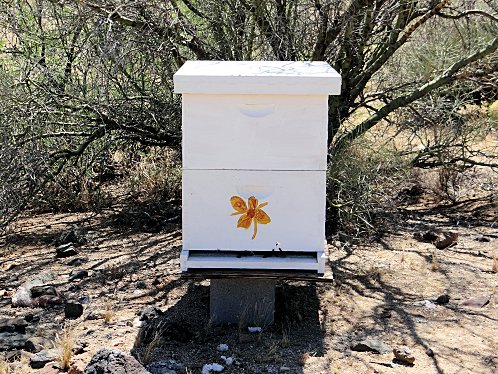 | 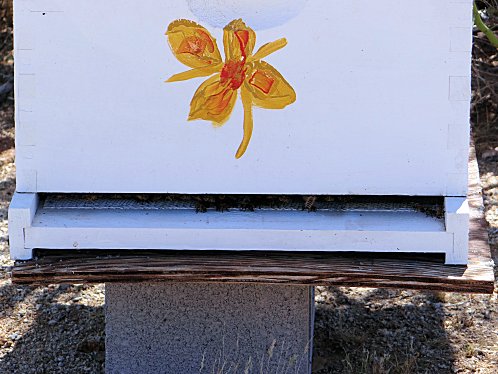 |
| Eve DeLanges Bee Hive. New Package Bees After 5 Weeks Start Up. Photo Taken May-24-2013. | Eve DeLanges Bee Hive. New Package Bees After 5 Weeks Start Up. Photo Taken May-24-2013. |
|---|---|
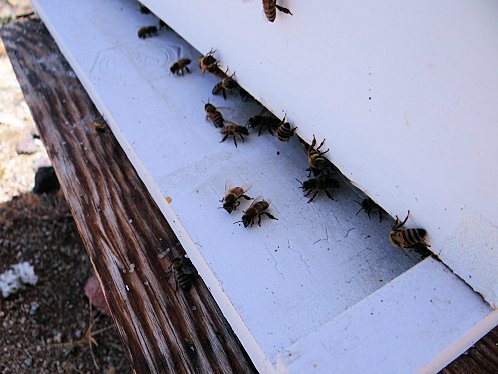 | 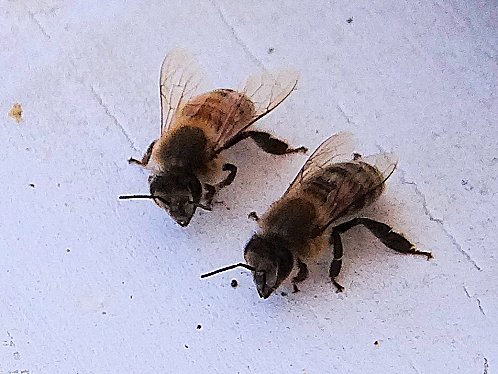 |
| Eve DeLanges Bees. New Package Bees. During A Honeyflow But Using 1 Gallon / Day 1:1 Sugar Syrup! 16 Frames Are Drawn On New Plastic Foundation! Photo Taken May-29-2013. | New Package Bees. During A Honeyflow But Using 1 Gallon / Day 1:1 Sugar Syrup! 16 Frames Are Drawn On New Plastic Foundation! Photo Taken May-29-2013. |
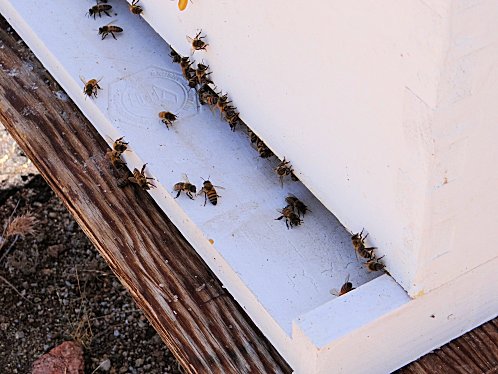 | 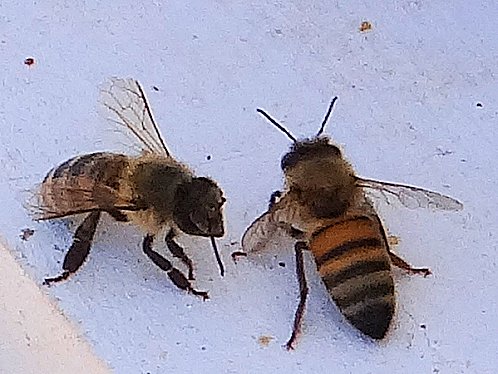 |
| Eve DeLanges Bees. New Package Bees. During A Honeyflow But Using 1 Gallon / Day 1:1 Sugar Syrup! 16 Frames Are Drawn On New Plastic Foundation! Photo Taken May-29-2013. | Eve DeLanges Bees. New Package Bees. During A Honeyflow But Using 1 Gallon / Day 1:1 Sugar Syrup! 16 Frames Are Drawn On New Plastic Foundation! Photo Taken May-29-2013. |
 |  |
| Catching A Swarm!! A Swarm lands On A Creosote Bush | Place A Swarm Box With Honey Comb, Lid Open, Next To The Swarm |
|---|---|
 |  |
| They Go Inside And Start To Fly In And Out The Front | After About 15 Minutes They Are Almost All Captured! Slowly Start Closing The Lid |
 | 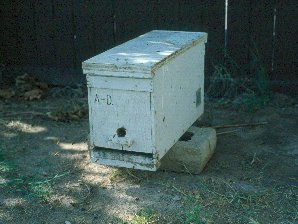 |
| Close The Lid Come Back In The Night Move Them To New Location | Next Morning Happily Working At New Location!! |
 |  |
| Check On Their Progress After A Few Days Move To A Regular Size Hive | After About Six Weeks They Should Be A Strong Productive Hive! |
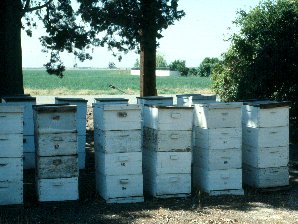 | 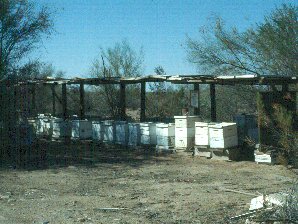 |
| Arizona Beekeepers Find That Bees | Do Better Close To Water In Shade |
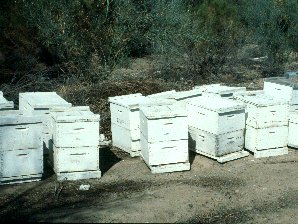 | 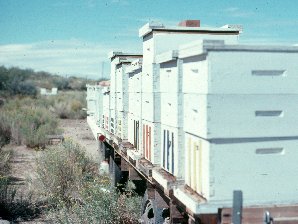 |
| Sometimes You Have To Keep Them In The Sun But They Have To Be Near Water | Some Beekeepers Permanently Place Hives On Trailors To Easily Move Them To The Flowers |
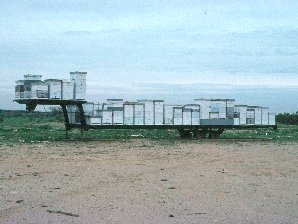 | 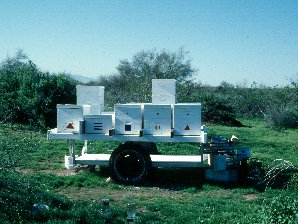 |
| Some Trailers Are Large | Some Trailers Are Small |
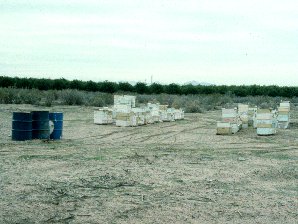 | 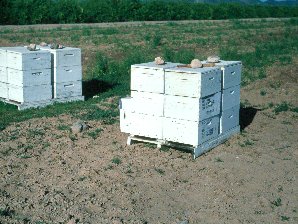 |
| On Cold Days About Seven Weeks Before The HoneyFlow Start Feeding The Bees To Make The Queen Lay Eggs Barrels Are Full Of Sugar Water | Some Move Bees On Pallets To Trailors To Follow The HoneyFlow |
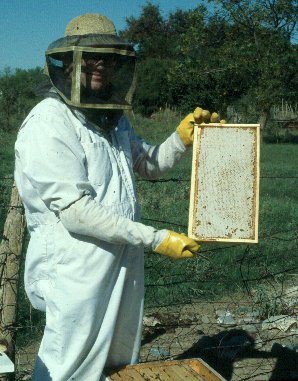 | 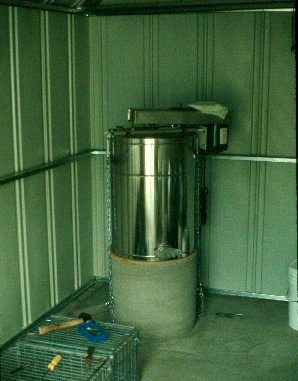 |
| George And Some Premium Honey | George's Honey Extractor |
Here Are Some Links To The Very Best & Most Popular Items Sold On Amazon.Com
To Learn More! Click The Links Below. No Obligation, Of Course!
